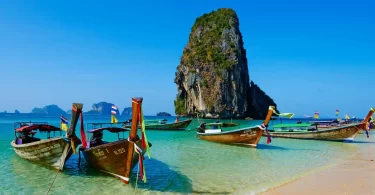- Todays attacks in Kabul, Afghanistan are also an attack on World Tourism.
- The August 26th attacks on the Kabul airport’s civilians trying to depart Afghanistan serve as a further reminder of how dangerous the situation is in Afghanistan.
- With the final date for the US and its allies’ departure from that country fast approaching it is important that tourism industry professionals take a deep breath and consider the potential impact of the Taliban’s victory on the world of tourism.
The World Tourism Network feels it’s important for this global sector not to be immune to the current global development on COVID, Climate Change, and terror threats.
WTN President Dr. Peter Tarlow who is also a recognized safety and security expert in the travel and tourism industry writes:
Tourism is not separate from the many ongoing current global crisises
Although there will be numerous articles regarding the Taliban takeover of Afghanistan written from the political perspective it is often impossible to separate the world of political actions from the world of tourism. For example, Al Qaeda’s attacks in September of 2001 were political actions, but the results were an immediate economic for tourism and the tourism industry still feels some twenty years later the reverberations of September 11, 2001. September 2021 will not only mark twenty years since the attacks that are also called 9-11 (September 11th) but the dawn of a potentially new and more dangerous era for the world of tourism.
No one knows what the world of tourism will look like in 6 months, a year, or two years from now. The tourism industry is always vulnerable to unpredictable or unforeseen political or economic events that are often called “black swan” events.
As advanced communications make it seem that the world grows ever smaller, and events become known around the world almost instantaneously it appears that there the number of black swan events increases with time.
These events often influence our traveling decisions, both for pleasure and for business. Tourism officials need to be ever mindful that the currents of history are not single events, but a potpourri of events. Ironically these mixtures seem unlikely prior to their occurrence but once having occurred seem in hindsight to have been the logical outcome.
The events of the late summer of 2021 exemplify this mélange of events and from a tourism, industry perspective require thoughtful analysis. Although I am writing this article from a United States perspective, in reality, many of these historic currents will impact the world tourism industry.
The summer of 2021 was filled with both new and unresolved challenges. For example, the tourism industry had hoped that by the end of the northern hemisphere’s summer that the COVID-19 pandemic would have become a part of history rather than an ongoing challenge.
The Delta Variant of the COVID pandemic ended that hope.
In August of 2021 much of the world is stuck in issues such as to vaccinate or not and if a third shot is necessary. Six months ago, no one, or very few people, had heard of the Delta variant of COVID.
Tourism centers, like Hawaii, were booming, and there was hope that the cruise industry would soon be on its feet.
Instead, we read headlines such as: “Hawaii Gov. Discourages Travel to State Amid Uptick in COVID-19 Cases” (Travel & Leisure magazine), or Booking Hawaii Travel is now a life and death decision. (eTurboNews)
This increase in covid cases is occurring at around the same time that the US (and much of the world) is experiencing its worst case of inflation in decades.
Headlines such as the following one from CNBC (July 2021) “Inflation climbs higher than expected in June as price index rises 5.4%” state what any person who shops already knows. It is especially important that tourism officials understand the impact of inflation as healthy retired people compose a sizeable segment of the leisure tourism industry. This segment of the traveling public often lives on fixed incomes and is particularly sensitive to rising prices.
An additional crisis to impact the tourism industry are crimes
.For example in a BBC news article on July 7th about crime in America states: “The New York Times looked at 37 cities across the US with data for the first three months of this year (2021), and overall there has been an 18% increase in murders compared with the same time period in 2020.”
Such headlines around the world discourage travel to the United States once its borders reopen. The crime wave has also impacted domestic travel to such US cities as Chicago, Portland, Oregon, Miami, Houston, San Francisco, Seattle, Washington, DC, and New York City.
The attack on the Kabul airport today underlines the fact that tourism now faces new threats.
At this point, no one knows exactly how deadly the Taliban’s takeover of Afghanistan will be on world tourism.
What we do know is that Afghanistan is now under the almost complete control of a terrorist group. The Taliban rule over Afghanistan twenty years ago resulted in a safe haven for Al-Qaida terrorists and numerous attacks against major political and tourism targets such as New York’s World Trade Center.
The fact that Afghanistan is now controlled by a fundamentalist Islamic group makes the situation completely different from other current problems, especially as tourism has in the past served as a magnet for terrorism attacks. The potential for terrorists doing major harm to the tourism industry is now greater than at any point since the 9-11 attacks.
A quick summary of some of the challenges that the fall of Afghanistan means for world tourism:
- Travel might get a lot harder and more dangerous. The fact that there are now thousands of non-vetted people who have left Afghanistan means that there is a chance that at least some of these people might be part of sleeper-cells and governments will have to take added precautions until it is clear who is traveling and for what circumstances.
- The US-Mexico border, already dangerous, will become a lot more dangerous. The United States during the last seven months has had in effect an “open-border” policy. Un or poorly vetted migrants now enter the United States from both friendly and unfriendly nations. Some of these people come for reasons of political asylum or economic opportunity. Others might be coming for less positive reasons and once in the US they are basically free to go wherever they please. This non-stop unregulated migration has already resulted in the rise of crime and illnesses including Covid.
- Europe should expect an increase in unvetted refugees who will continue to make Europe less safe and less attractive to visitors. The result will be a decline in European living standards and quality of life.
- The Taliban’s’ traditional source of income, illegal drugs and especially the production of heroine, will increase and this increase is bound to cause problems for the tourism industry. “Narcotic farmers” will no longer have to fear anything other than a tax collector and the result might be a major increase in drug (and perhaps even sex) trafficking around the world, especially in the western nations. It is these nations that produce most of the world’s tourism.
- The United States’ sudden pullout from Afghanistan and its lack of coordination with its NATO allies might well result in a weaken NATO alliance exactly at the time when tourism may face renewed terrorism threats. The tourism industry is going to need to work together and with multiple government agencies against any new threats of terrorism or organized crime.
- The fact that currently the Chinese see a weak America might encourage an attack on Taiwan or other parts of the South China sea. Such levels of instability can only hurt tourism recovery both along the Asian Pacific rim and in southern Asian countries Tourism in this region can become totally dominated by the Chinese and countries such as North Korea might become emboldened to act in a reckless manner. It should be remembered that much of the world’s cargo goes by ship and attacks on major sea lanes could result in increased transportation prices.
- The fall of Kabul is a wake-up call for tourism executives. This is not to the time to cut back on tourism security but rather plan for a potentially difficult period of time.
Tourism leaders will need to work with their governments, law enforcement agencies, and their health ministries to create conditions for expanded tourism industry and greater safety and security.
These will not be easy times, but the tourism industry it is to survive must face realities, must be prepared for the worst, but at the same time pray for the best and work to bring people together.
About World Tourism Network (WTN)
WTN is the long-overdue voice of small and medium-size travel and tourism businesses around the world. By uniting our efforts, we bring to the forefront the needs and aspirations of small and medium-sized businesses and their Stakeholders.
By bringing together private and public sector members on regional and global platforms, WTN not only advocates for its members but provides them a voice at the major tourism meetings. WTN provides opportunities and essential networking for its members in currently 128 countries.
More information on membership and activities go to www.wtn.travel







